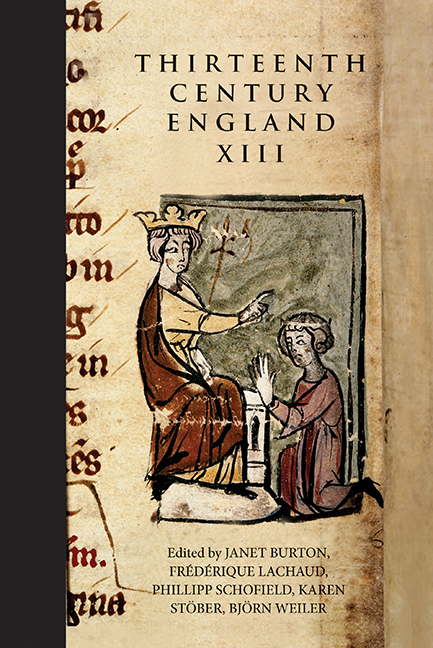Book contents
- Frontmatter
- Contents
- List of Illustrations
- Preface
- Contributors
- Abbreviations
- Political Ideas and Dialogue in England in the Twelfth and Thirteenth Centuries
- Peripatetic and Sedentary Kingship: The Itineraries of John and Henry III
- Peter of Aigueblanche's Support Network
- A Captive King: Henry III between the Battles of Lewes and Evesham, 1264–5
- The Conflictus inter Deum et Diabolum and the Emergence of the Literature of Law in Thirteenth-Century England
- Prosecuting Ravishment in Thirteenth-Century England
- John of Crakehall: The ‘Forgotten’ Baronial Treasurer, 1258–60
- Credit Finance in Thirteenth-Century England: The Ricciardi of Lucca and Edward I, 1272–94
- (Socio)linguistic Realities of Cross-Channel Communication in the Thirteenth Century
- The Treaties of Paris
Prosecuting Ravishment in Thirteenth-Century England
Published online by Cambridge University Press: 15 September 2017
- Frontmatter
- Contents
- List of Illustrations
- Preface
- Contributors
- Abbreviations
- Political Ideas and Dialogue in England in the Twelfth and Thirteenth Centuries
- Peripatetic and Sedentary Kingship: The Itineraries of John and Henry III
- Peter of Aigueblanche's Support Network
- A Captive King: Henry III between the Battles of Lewes and Evesham, 1264–5
- The Conflictus inter Deum et Diabolum and the Emergence of the Literature of Law in Thirteenth-Century England
- Prosecuting Ravishment in Thirteenth-Century England
- John of Crakehall: The ‘Forgotten’ Baronial Treasurer, 1258–60
- Credit Finance in Thirteenth-Century England: The Ricciardi of Lucca and Edward I, 1272–94
- (Socio)linguistic Realities of Cross-Channel Communication in the Thirteenth Century
- The Treaties of Paris
Summary
Introduction
Three ravishment allegations from thirteenth-century court records tell very different stories. A 1208 record narrates the kidnapping (abductione) of the wife of Samson de la Pomerai in a case revealing the Latin antecedents for a modern criminal term. A generation later, Maud daughter of Aylwine, came before justices at the Oxfordshire Eyre to complain of her rape (rapo) by Thomas of Fifield, who had violently deflowered her. Here is a clear example of how the Latin rapo evolved into our modern English term for rape. Finally in 1290 Walter Lyppe instigated a civil lawsuit alleging that the priest Anselm of Hatfield had ravished and abducted (rapuit et abduxit) his wife Juliana.
This last example might lead those uninitiated in the vocabulary that late medieval English scribes used for sexual and marital offences to conclude that Juliana was raped and abducted. Legal historians and literary scholars, especially those interested in what, exactly, the later authors Chaucer and Malory were charged with when they were accused of raptus, have demonstrated the ambiguity of that Latin term in the Middle Ages. It could refer to a woman's sexual violation, or it could denote her abduction – with or without her consent – and with or without sexual connotation. The first two examples given above date to the earlier thirteenth century, while the third mirrors the late thirteenth-century conflation of these two offences; a conflation most evident in the first and second statutes of Westminster (1275 and 1285). With these statutes, what were previously two offences became one under common law. This essay considers why this conflation occurred and what it meant for the women and their families who were affected by ravishment. Lawsuits based on the new pairing rapuit et abduxit proliferated after 1285. Juliana Lyppe's ravishment provides one of the earliest examples, and also highlights how prosecution narratives do not tell the whole story, for, according to jurors, Anselm had not forcibly raped or abducted Juliana; instead she had departed willingly from her cruel husband, and was having an affair with the priest.
The study of ravishment, despite its ambiguities, illuminates the topics of women, family, law, and disorder in medieval England.
- Type
- Chapter
- Information
- Thirteenth Century England XIIIProceedings of the Paris Conference, 2009, pp. 67 - 82Publisher: Boydell & BrewerPrint publication year: 2011



